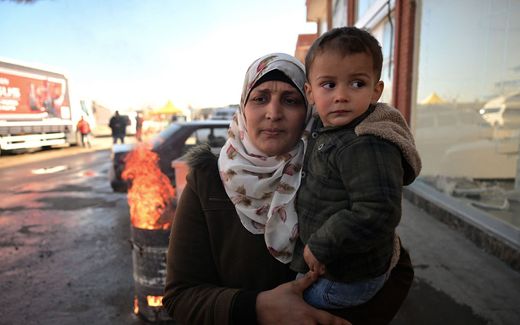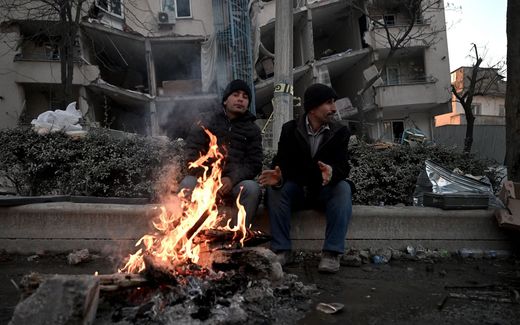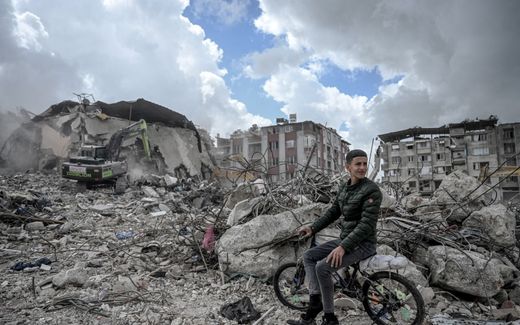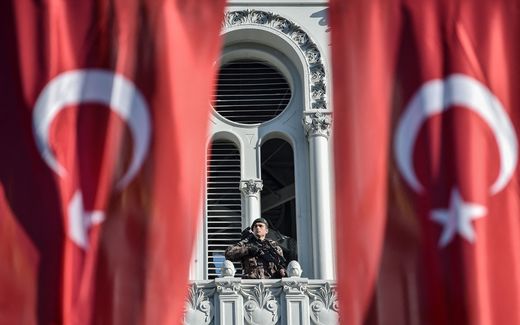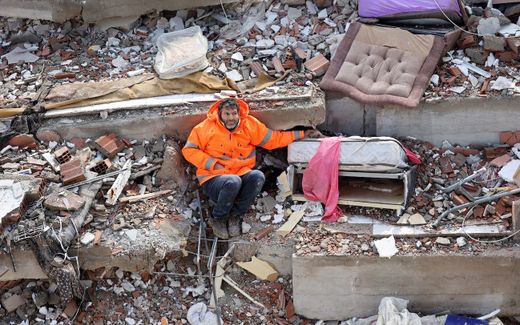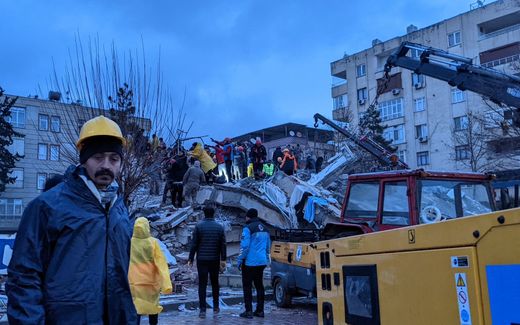Being a Turk and a Christian at the same time? You can't do that in Turkey
27-05-2023
Southern Europe
Leendert de Bruin, RD
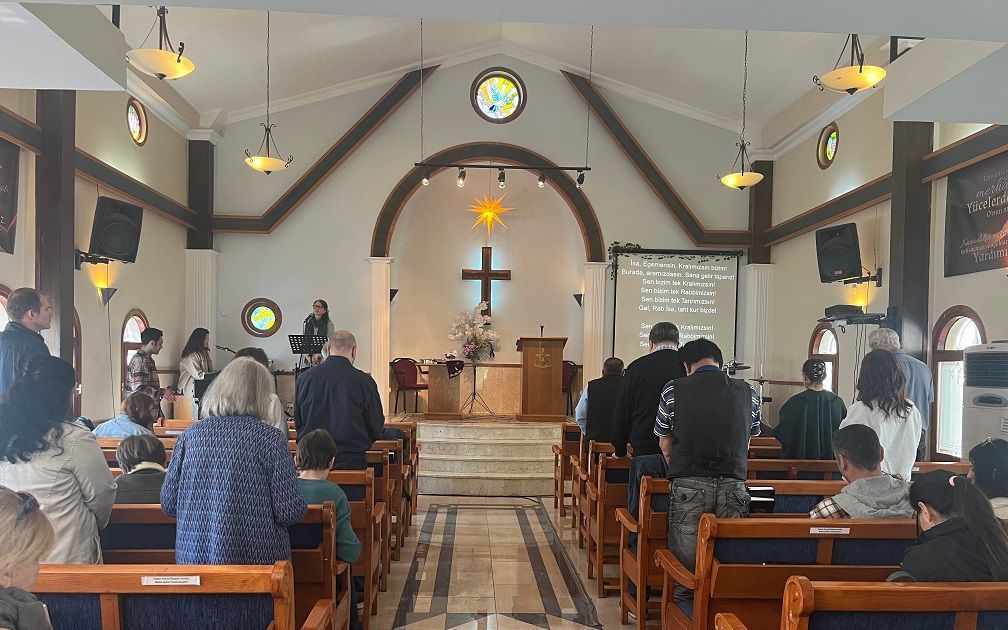
The neighbourhood cannot fail to notice: this is where followers of Isa –Jesus– gather. Photo RD
Southern Europe
For many Turks, it is inconceivable: being Turkish but not being a Muslim. Distrust towards the small Protestant community in Turkey is therefore high. "It's important that we give a good testimony."
Some 30 people gathered in the hall of the Protestant church in Istanbul on this Sunday morning. "Jesus, You alone are King. You alone are our God," the attendees sing in Turkish. The door of the church building, sandwiched by flats, is wide open. The neighbourhood cannot fail to notice: this is where followers of Isa –Jesus– gather.
The open confession is at odds with the beliefs of the vast majority of the Turkish population, which is about 98 per cent Muslim. Five times a day, the lilting Islamic prayer call can be heard on every street corner in Istanbul. The Altintepe district on the Anatolian side of the metropolis is no exception. There are at least eight mosques within a few hundred metres of the Istanbul Protestant Kilisesi Vakfi alone.
Agressive
Nevertheless, the Christian house of worship does not cause any problems in the neighbourhood, pastor Timur Topuz (46) says after the service. On the contrary, he says, the relationship with residents is excellent. "There have been times when aggressive characters harassed us, but the local residents intervened," he says over Turkish tea.
The church did have to gain that trust. After all, the Turkish population holds the necessary prejudices. Christianity, for instance, is said to be something for foreigners. Turkish identity is so closely linked to Islam that many Turks cannot imagine that someone can be Turkish and not be a Muslim. This nationalistic thinking leaves little room for minorities, let alone Turks who convert to Christianity.

Topuz experienced it first-hand. When he told his Muslim family and friends in the 1990s that he had become a Christian, he encountered a lot of misunderstanding. "For my father, I had turned into an enemy of the Turks. He said, "You have become Armenian." As a Christian, I had to have a different ethnic background. My Muslim friends wanted nothing more to do with me."
As the years passed, the family members' thinking changed. "They noticed how my life had changed. Last year, my wife died after an illness. When my family saw how church members supported me, it was an important testimony for them," says the widower. "Now they understand that Christians are not hostile but have a warm heart for others. It is important to give a good testimony."
Luxury
Soner Tufan underlines that. He is the general secretary and spokesperson of the Association of Protestant Churches (TeK). "It is important that we show ourselves. To win the trust of Turks, you have to put a lot of effort into the relationship," he says in his office in the Turkish capital Ankara. Tufan, therefore, wants to be open about being a Christian and the church in Turkey. "That way, we can dispel prejudices. We do love this country. We are not an enemy."
TeK represents a large part of the Protestant community in Turkey. Almost 200 churches are affiliated with the umbrella organisation. Tufan: "The churches are independent, but we don't have the luxury of operating independently of each other or measuring each other theologically. We find each other in the cross of Christ. The Protestant community is about 10,000 believers in a population of 90 million. We desperately need each other."
Given the vulnerable position of Protestant churches, Tufan –and the wider Christian community– prefers not to talk about contemporary Turkish politics. They certainly do not want to burn their fingers on the presidential elections. The church should be above politics, says the spokesperson.
Nevertheless, Tufan does not mince his words regarding freedom of religion in Turkey. Every year, he draws up a report for the TeK in which it talks unflatteringly about "human rights violations". "In general, there is freedom of religion in our country," says Tufan. "But we do face some big challenges as a Protestant community."
Deportation
One is a hostile social climate. In recent years, for instance, Tufan has seen a marked increase in hate speech on social media. In southwest Turkey, a church worker in Kurtuluş received death threats via Facebook. The perpetrator was arrested but was soon released. According to Tufan, a climate of impunity encourages online threats.
Also, the Protestant community –and most other minority religious groups– are still not allowed to train clergy within the Turkish education system. As a result, the need for foreign pastors and church workers remains. In recent years, however, the Turkish government actively campaigned to deport or deny this group of foreigners entry into Turkey. Many congregations ran into difficulties, and the need for religious workers remains high, says Tufan.
Adding to this, many Protestant congregations are denied legal status as churches. The authorities recognise only Greek Orthodox and Armenian Christians and Jews as minorities. As a rule, churches are registered as associations or foundations to still have some legal status. Tufan: "It is clear how vulnerable the place of worship is for the Protestant community."
Marble floor
A stark contrast to the situation of Protestant churches is the Mor Efrem Syriac Orthodox Church. The five-storey building in the affluent Yesilkoy district in the European part of Istanbul is nearing completion. According to church leaders, it is the first time in the history of the Turkish Republic that a church has been built with official permission from the authorities.
Inside, workers are putting the finishing touches to the interior. One of them polishes the marble floor with a sander. A stained-glass window of Mor Efrem, an important saint after whom the church is named, is partly hidden behind scaffolding. A little further on, a large wall plaque depicting a Christmas scene lies on its side next to pews waiting for a place on the wall.

The cost of the construction –5 million dollars– has been raised entirely by the Syrian Orthodox community, some 20,000 people, says Ercan Uslucan. He is a spokesman for the church administration. In 2010, the church leadership contacted the government to seek permission to build its church. Until then, the Orthodox had been meeting in a Roman Catholic church. But that creates too many practical problems.
President Erdogan makes the case for building the church, Uslucan says. "He understood our situation. The president urged all relevant departments to give us this permit." Construction could begin in 2019. Erdogan laid the foundation stone. "That was a huge boost for us," he said. The president is also expected to attend the church's opening later this year.
Discrimination
With the construction of the church, Erdogan is showing his best side. But the Turkish president has an ambivalent attitude toward the Christian minority. In 2020, he showed little concern for feelings within the Christian community when he had the Hagia Sophia in Istanbul converted into a mosque. Thus, Erdogan more often shows two faces. On the one hand, an Easter greeting in which the president emphasises peaceful coexistence; on the other, discrimination is the order of the day. Non-Muslims are tacitly barred from government jobs.
This ambiguity also applies to the Syrian Orthodox Church. Despite the construction of a new church, the presence of this ancient Christian community in southeastern Turkey is under considerable pressure. Authorities confiscated dozens of the church's premises and religious buildings in recent years. Uslucan stressed –after first consulting two of the board members in the background– that there was a misunderstanding between the church and the authorities. Again, the president gets all the praise: "Erdogan had a special law made through which we got our property back."
According to the church administration, the current government respects all religions. "Right now, we have an Islamic government. That may give the feeling that Christians have many problems, but the opposite is true. On the contrary, it is trying to protect us."
Related Articles

